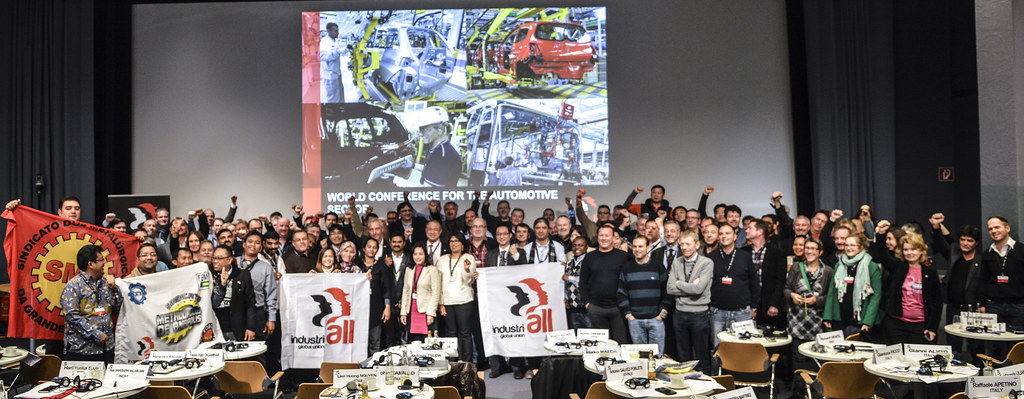17 November, 2016Some 125 trade unionists from 30 countries met in Munich, Germany for IndustriALL Global Union’s Auto World Conference this week, setting out a new action plan as the industry undergoes unprecedented change.
Conference participants, representing workers at all the world’s major auto companies, heard how CO2 emissions targets, electric and autonomous vehicles, and digitalization will have a radical affect on the auto industry creating both challenges and opportunities.
"For the first time in the history of the car industry, companies are being forced into a revolution that questions their own business model," said Helmut Lense, IndustriALL's automotive director.
IndustriALL's general secretary, Valter Sanches, appealed to unions in the auto sector to use their influence to help workers throughout the supply chain.
“IndustriALL’s trade union networks at the major producers are strong, but more must be done to improve the conditions for workers at suppliers to the auto industry.”
A common theme of the conference was the prevalence of precarious work in the sector. Richard Gentil from FTM-CGT reported that some factories in France are using 80 per cent temporary workers. He said there are 9,000 temporary workers at Renault alone.
Jerry Dias, president of Unifor in Canada, which represents 40,000 workers in the auto industry, said precarious work, global competition and the drive for increased profits are reducing all workers’ quality of life.
Sanmugam Selvarani from the NUTEAIW in Malaysia said her union faced a major challenge to organize precarious and migrant workers, who are the most exploited workers in the automotive industries in the country.
IndustriALL has a mandate from Congress to put supply chains at the heart of its work, assistant general secretary, Kemal Özkan told participants:
“Unions need to give more importance to support union activities in auto suppliers and reinforce organizing in the supply chain.”
IndustriALL President, Jörg Hoffmann, said that while the demand for cars is still growing with 100 million sold across the world every year, there is no real job security.
“Workers and locations are played off against each other. Pressure on working conditions is high. At the same time, growth is flanked by a huge structural change in our industry.”
Hofmann spoke of the rapid uptake of electrical vehicles in Germany, threatening 40,000 jobs in the production of the internal combustion engine.
“We need to respond to this situation with new union strategies. Increasing pollution in the cities of Delhi and Beijing tells us there is no alternative and the auto industry needs to be environmentally sustainable. In this process the transition should be a Just Transition for workers.”
Following the Congress resolution in Brazil, a UAW statement on behalf of skilled-trade workers at Volkswagen in Chattanooga, USA, urged the Volkswagen World Works Council and German affiliate IG Metall to pressure Volkswagen into enter into collective bargaining with the workers.
Participants unanimously approved the action plan for the sector. The activities include
- convening a high-level union meeting to discuss new approaches on organizing in North America
- developing strategies on the auto supply chain, particularly at suppliers
- strengthening efforts to organize precarious workers
The action plan calls for special attention to the effects of climate change and digitalization in the automotive industry and supports IndustriALL’s demands for a Just Transition in the context of sustainable industrial employment for autoworkers.
“Our action plan gives us a detailed and clear path to tackle the challenges we face in the auto sector, particularly precarious work and supply chain issues.
“We are looking forward to strengthening our agreements with producers and building networks in Asia, which is increasingly the global hub of automotive industry production,” stated Lense.
To see photos from the conference, please go to our flickr page.










